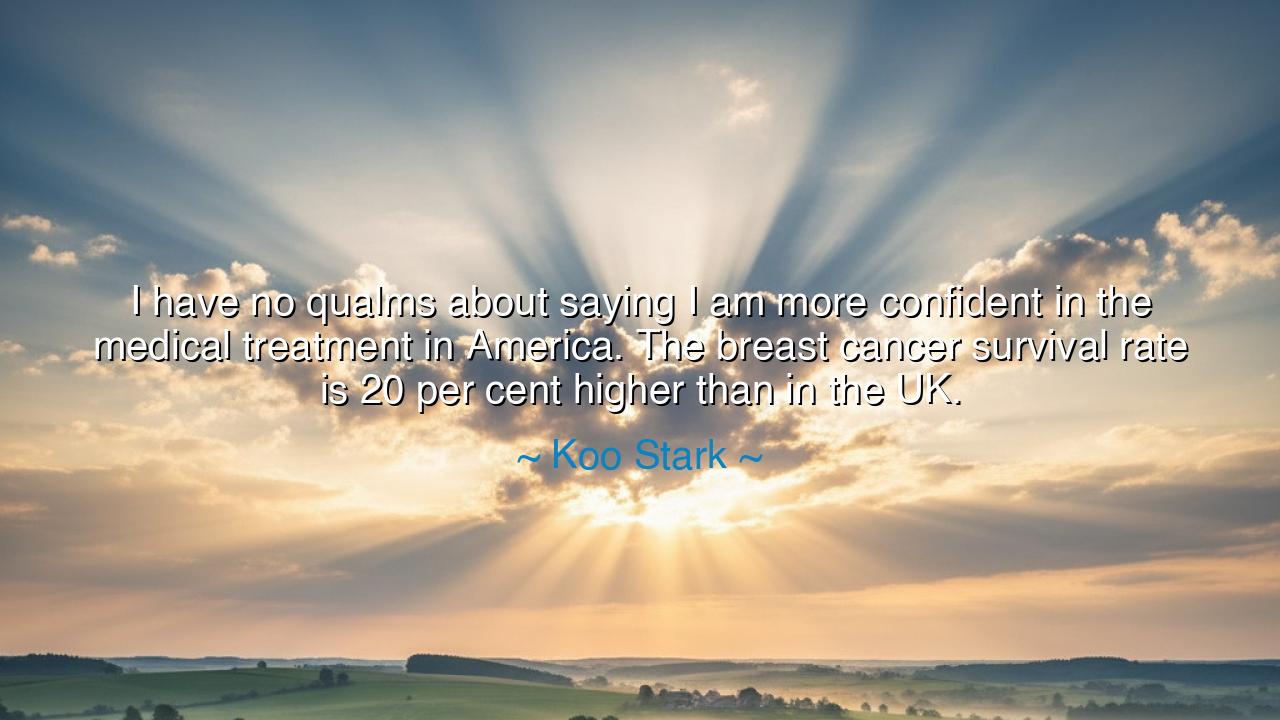
I have no qualms about saying I am more confident in the medical
I have no qualms about saying I am more confident in the medical treatment in America. The breast cancer survival rate is 20 per cent higher than in the UK.






Hear the candid and unflinching words of Koo Stark, who once declared: “I have no qualms about saying I am more confident in the medical treatment in America. The breast cancer survival rate is 20 per cent higher than in the UK.” These words, sharp and direct, are born not of abstraction but of life and death, of the trembling line between despair and hope. They speak of trust in systems of healing, of faith in the hands of physicians, and of the painful reality that where one is treated may alter the very outcome of one’s life.
The meaning of this statement lies in its comparison of two great nations, both rich in history and wisdom, yet different in their approach to medical treatment. Stark speaks of confidence, of the strength she feels in entrusting herself to one system over another. Her measure is not sentiment, but survival. She places before us the stark number—that the breast cancer survival rate is higher in one land than the other—and from this draws her conviction. Thus, her words remind us that healing is not only about compassion, but also about effectiveness, about outcomes that can be weighed and measured in lives saved.
The origin of this utterance arises from Stark’s own confrontation with illness, and her search for hope amidst fear. To speak of cancer is to speak of the enemy that stalks the body unseen, striking the mighty and the meek alike. When faced with such an adversary, a patient must place her trust in the healers, the medicines, the institutions that promise deliverance. Stark’s declaration is both personal and universal: she found her faith in the American system, and she marks the difference with the measure that none can ignore—life itself.
History shows us that such comparisons have long shaped the choices of the afflicted. Consider the story of Alexis de Tocqueville, who in the 19th century studied prisons in America not to belittle Europe, but to observe where methods differed, and where hope for reform was greater. Likewise, patients across ages have traveled great distances to seek cures where survival seemed more likely. In the ancient world, the sick would flock to the healing temples of Asclepius in Greece, believing those sacred places superior to the remedies of their own towns. So too in Stark’s time, the journey to another land for treatment echoed this timeless pilgrimage: where healing thrives, the suffering will go.
The emotional weight of Stark’s words lies not merely in statistics, but in their human resonance. To speak of a 20 per cent higher survival rate is to speak of mothers who live to raise their children, of daughters who survive to comfort their parents, of voices that continue to sing when otherwise they would be silenced. Her statement is not an attack but a plea, a recognition that human lives are shaped by the strength of their healers, and that systems of care bear responsibility not only to treat but to excel.
The lesson is clear: we must measure our systems not by pride, but by outcomes. The dignity of medicine lies not in its grandeur, but in the number of lives it preserves and the quality of those lives. To be content with less when more is possible is to betray those who depend on care. Stark’s words call us to demand better, to seek not only treatment but advancement, to strive until survival itself becomes the norm rather than the exception.
Therefore, let your actions reflect this wisdom. If you live in a land where healing excels, support it, strengthen it, and ensure it remains accessible to all. If you dwell where outcomes falter, do not rest in complacency—press for improvement, for innovation, for justice in care. And for each person, no matter their station, remember that to respect life is to seek always the best path to preserve it, even if it leads across seas or challenges tradition.
And so, remember the teaching of Koo Stark: confidence in medicine is earned by results, and survival is the truest measure of healing. Let us honor the healers who save, and let us demand systems that do not merely offer treatment, but deliver life. For in this lies the highest calling of humanity—to guard one another from the shadows of death, and to lift each soul toward the light of survival and hope.






AAdministratorAdministrator
Welcome, honored guests. Please leave a comment, we will respond soon